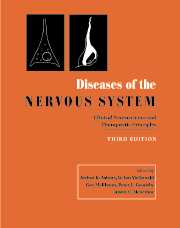Book contents
- Frontmatter
- Dedication
- Contents
- List of contributors
- Editor's preface
- PART I INTRODUCTION AND GENERAL PRINCIPLES
- PART II DISORDERS OF HIGHER FUNCTION
- PART III DISORDERS OF MOTOR CONTROL
- PART IV DISORDERS OF THE SPECIAL SENSES
- PART V DISORDERS OF SPINE AND SPINAL CORD
- PART VI DISORDERS OF BODY FUNCTION
- PART VII HEADACHE AND PAIN
- PART VIII NEUROMUSCULAR DISORDERS
- PART IX EPILEPSY
- PART X CEREBROVASCULAR DISORDERS
- PART XI NEOPLASTIC DISORDERS
- PART XII AUTOIMMUNE DISORDERS
- PART XIII DISORDERS OF MYELIN
- PART XIV INFECTIONS
- PART XV TRAUMA AND TOXIC DISORDERS
- PART XVI DEGENERATIVE DISORDERS
- PART XVII NEUROLOGICAL MANIFESTATIONS OF SYSTEMIC CONDITIONS
- 121 Neurological aspects of pregnancy
- 122 The brain and the cardiovascular system
- 123 Neurological complications of hepatic and gastrointestinal disease
- 124 Renal disease and electrolyte disturbances
- 125 Disorders of intracranial pressure
- 126 Neurologic manifestations of endocrine disease
- 127 Neurological manifestations of hematological diseases
- 128 Neurocutaneous syndromes
- 129 Neurological complications after organ transplantation
- Complete two-volume index
- Plate Section
126 - Neurologic manifestations of endocrine disease
from PART XVII - NEUROLOGICAL MANIFESTATIONS OF SYSTEMIC CONDITIONS
Published online by Cambridge University Press: 05 August 2016
- Frontmatter
- Dedication
- Contents
- List of contributors
- Editor's preface
- PART I INTRODUCTION AND GENERAL PRINCIPLES
- PART II DISORDERS OF HIGHER FUNCTION
- PART III DISORDERS OF MOTOR CONTROL
- PART IV DISORDERS OF THE SPECIAL SENSES
- PART V DISORDERS OF SPINE AND SPINAL CORD
- PART VI DISORDERS OF BODY FUNCTION
- PART VII HEADACHE AND PAIN
- PART VIII NEUROMUSCULAR DISORDERS
- PART IX EPILEPSY
- PART X CEREBROVASCULAR DISORDERS
- PART XI NEOPLASTIC DISORDERS
- PART XII AUTOIMMUNE DISORDERS
- PART XIII DISORDERS OF MYELIN
- PART XIV INFECTIONS
- PART XV TRAUMA AND TOXIC DISORDERS
- PART XVI DEGENERATIVE DISORDERS
- PART XVII NEUROLOGICAL MANIFESTATIONS OF SYSTEMIC CONDITIONS
- 121 Neurological aspects of pregnancy
- 122 The brain and the cardiovascular system
- 123 Neurological complications of hepatic and gastrointestinal disease
- 124 Renal disease and electrolyte disturbances
- 125 Disorders of intracranial pressure
- 126 Neurologic manifestations of endocrine disease
- 127 Neurological manifestations of hematological diseases
- 128 Neurocutaneous syndromes
- 129 Neurological complications after organ transplantation
- Complete two-volume index
- Plate Section
Summary
Neurological signs and symptoms occur in virtually every known endocrine disturbance. This chapter focuses primarily on the neurological manifestations of diseases of the thyroid and the adrenal glands. The neurological complications of parathyroid disease largely reflect disordered calcium metabolism and are discussed in Chapter 124. The numerous neurological complications of diabetes mellitus, hypoglycemia, and pancreatic disorders are also dealt with elsewhere. Neurological manifestations of the hypothalamus and pituitary disease are reviewed in Chapter 57. The endocrine disturbances associated with anorexia nervosa are considered in Chapter 54.
Neurological complications of thyroid disease
Hyperthyroidism
Neuropsychiatric disorders, seizures, and headaches
Neuropsychiatric symptoms are common in hyperthyroidism. Many patients complain of feeling nervous, anxious and restless. They note difficulty in concentration and a shortened attention span. Friends or relatives describe them as irritable or capricious. Frank psychoses are uncommon, but agitated depression has been reported in severe thyrotoxicosis (Logothetis, 1961). In elderly patients, an apathetic state with lethargy, depression (Ettigi & Brown, 1978) or cognitive impairment may occur (Martin & Deam, 1996). Although the mechanism by which thyroid hormone produces these mental changes is unknown, symptoms usually resolve when thyroid function is restored to normal.
In patients with the life-threatening forms of hyperthyroidism known as thyroid storm, agitated delirium progresses to lethargy and coma (Newcomer et al. 1983). Patients may have signs of bulbar palsy (see below) and convulsions can occur. There are serious systemic complications, including hyperpyrexia, tachycardia and other cardiac arrythmias, and a variety of electrolyte abnormalities. Treatment includes hydration, cooling, antithyroid medication, iodine, and corticosteroids (Tiegens & Leinung, 1995). Plasmapheresis may be useful (Newcomer et al., 1983).
Patients with epilepsy may show increased frequency of their seizures with hyperthyroidism. In some cases, hyperthyroidism is associated with a seizure disorder that disappears after the patient becomes euthyroid (Smith & Looney, 1983). In one study, nearly 10% of hyperthyroid patients had convulsions as their initial symptom (Jabbari & Huott, 1980); however, this figure is unusually high. The electroencephalogram in hyperthyroid patients may be moderately abnormal and returns with restoration of the euthyroid state (Leubscher et al., 1988)
Headache is a common symptom with hyperthyroidism.
Information
- Type
- Chapter
- Information
- Diseases of the Nervous SystemClinical Neuroscience and Therapeutic Principles, pp. 2033 - 2043Publisher: Cambridge University PressPrint publication year: 2002
